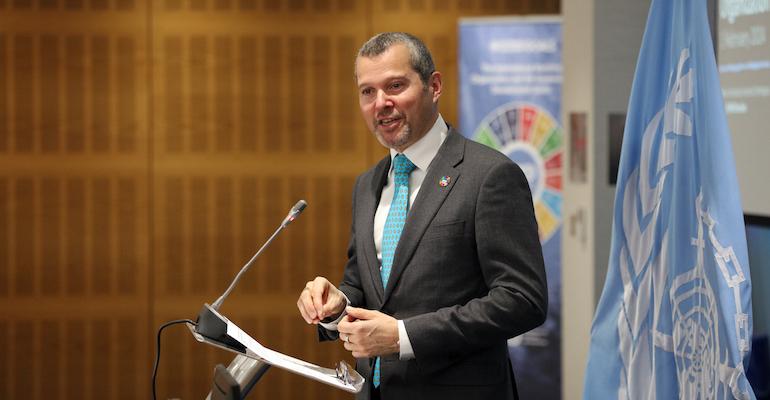In a statement that could see the IMO held as a hostage to fortune Dominguez said he is “confident” that an economic pricing mechanism will be agreed by this time next year, “but I’m just not sure what form it will take,” he added.
Speaking to the press during the first day of the Marine Environment Protection Committee (MEPC)’s 81st session Dominguez reiterated the path to realising historic new regulations that will lead to zero emissions from shipping is now set and “nothing can derail the process”.
“We are all moving in the same direction with the support of all the member states. I can’t predict the future, but we have a mandate to move to a pricing mechanism by 2027 and we’re working towards that,” said Dominguez.
Earlier in the day Dominguez had told MEPC delegates that achieving the IMO’s goals of zero emissions by, or close to, 2050 would take “concerted action” by the member states.
“The various updated proposals for technical and economic measures and the discussions during last week’s ISWG-GHG 16 clearly demonstrate your commitment to advance the developments of these measures, making sure that IMO delivers on the levels of ambition in the 2023 IMO GHG Strategy,” said Dominguez.
The Secretary General’s determination to achieve the ambitious task of decarbonising the maritime sector is faced with powerful vested interests that, while not being ignored, IMO refuses to speak their name, giving the impression that the UN body exists in a Harry Potter echo chamber.
Dominguez believes that even those member states that have vested interests understand that they must decarbonise and, therefore, they will be forced, by circumstance to back the decarbonisation programme.
In the end this will be the case, the question, however, is how far down the road to climate catastrophe will these Voldermorts go before an agreement is reached.
Maritime is a single, but very important, industry, while it cannot by itself prevent climate change it has an important role to play, not least because it is the major enabler of global trade.
Post Kyoto, which was signed in December 1997 and committed member states to dealing with the climate crisis, shipping made few moves to reduce carbon emissions, and some observers accused shipowners of intransigence on climate issues.
Fast forward 20 years and the IMO finally agreed a 50% cut in maritime emissions by 2050, a move that the EU was said have driven through with its block vote.
Since 2018 the maritime decarbonisation programme has gathered pace and interestingly there have been signs that shipowners do not speak with one voice.
Of the three largest shipping sectors, tanker owners often know the trades in which they operate, but their’s could be a sunset industry, at least in the transportation of crude oil.
Bulk carrier operators are often uncertain where their next charter will take them, posing a real problem for bunkering solutions for some operators, although they mainly have only one customer to contend with at a time.
The largest emitters, the container sector has many clients on each ship and it was these shippers that applied pressure on the container vessel operators, to change their ways.
Consumer influence played a critical role with key shippers creating shipper groups ready to show that their scope three emissions made them an environmentally responsible retailer or manufacturer.
Suddenly carriers realised there was a competitive advantage to be gained, Maersk, at the time the largest container line in the world, established a decarbonisation plan that excluded the highly polluting fossil fuel LNG, and opted to look at methanol and ammonia as alternative interim fuels.
Today, the number of new orders for dual fuel vessels that use methanol is outstripping those for LNG. New technologies such as wind energy are being developed, too slowly, but the direction of travel, as Dominguez emphasises, is towards decarbonisation.
IMO, although it remains technology and fuel agnostic, is evaluating the different alternative fuels that will meet the IMO’s interim targets in 2030 and 2040 and eventually reach net zero by 2050.
The plan is great, but if it has an Achilles heel it is the member states that must vote it through and must agree every step of the way. Each milestone is a point of jeopardy for the process and could see delays and obfuscation that the world can ill afford.
Dominguez’s confidence may be well founded, and the hope is that this is the case. The fear for many is that vested interests having tasted some success in delaying the process, even before Kyoto, will again celebrate further hurdles to ending the primacy of oil and gas energy.
For the IMO, it may be well worth remembering the old English adage of ‘many a slip twixt cup and lip’.
Copyright © 2024. All rights reserved. Seatrade, a trading name of Informa Markets (UK) Limited.
Add Seatrade Maritime News to your Google News feed.  |

